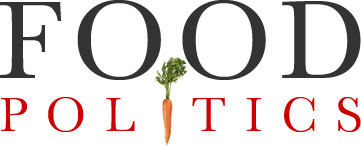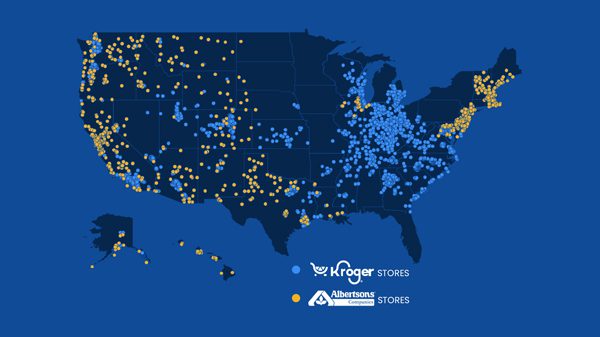
Dr. Marion Nestle is a renowned nutrition professor at NYU and Cornell. She follows-up on food industry funded research to present a clearer picture of the results and their trustability. Do the claims the industry makes actually hold up under review? Keep an eye on our Fact Check files to find out.
I subscribe to The Hagstrom Report, not least because Jerry Hagstrom reports on items I might not see otherwise. Here’s one: Kroger, Albertsons release list of stores to be sold: The Kroger Co. and Albertsons Companies have released the list of stores they intend to sell if their acquisition plan is approved.
He conveniently provided links to Kroger-Albertsons’ list of stores to be divested, and also to an article about the divestments with a handy map.

The updated divestiture package increases the total store count by 166 to include 579 stores that will be sold to, and continue operating as they do today by the new owner, C&S. Credit: Greg Johnson
From the map, you can see that most stores will be divested in the West: Washington (124 store), Arizona (101), Colorado (91), California (63), and Oregon (62).
One reason why the Federal Trade Commission sued to block the merger is evident – there will be fewer grocery stores available. Other reasons: less competition between the chains, and more power over employee wages, benefits, and working conditions.
The proposal says 579 stores will be sold to a new owner, C&S Wholesale Grocers.
Kroger says: “You’ll see that the 579 stores and other assets to be divested were thoughtfully chosen to allow C&S to succeed in the geographies and maintain – if not increase – the level of competition that consumers benefit from.”
The FTC’s original press release explained why the merger is not a good idea:
The FTC charges that the proposed deal will eliminate fierce competition between Kroger and Albertsons, leading to higher prices for groceries and other essential household items for millions of Americans…lower quality products and services, while also narrowing consumers’ choices for where to shop for groceries. For thousands of grocery store workers…[the merger] would immediately erase aggressive competition for workers, threatening the ability of employees to secure higher wages, better benefits, and improved working conditions…executives for both supermarket chains have conceded that Kroger’s acquisition of Albertsons is anticompetitive, with one executive reacting candidly to the proposed deal: “you are basically creating a monopoly in grocery with the merger.”
Monopolies are never good for consumers. Let’s hope the FTC holds firm on denying this merger.
The post The proposed Kroger-Albertson’s merger: divestment consequences appeared first in Food Politics by Marion Nestle.
Marion Nestle is Paulette Goddard Professor of Nutrition, Food Studies, and Public Health, Emerita, at New York University, which she chaired from 1988-2003 and from which she officially retired in September 2017. She is also Visiting Professor of Nutritional Sciences at Cornell. She earned a Ph.D. in molecular biology and an M.P.H. in public health nutrition from the University of California, Berkeley, and has been awarded honorary degrees from Transylvania University in Kentucky (2012) and from the City University of New York’s Macaulay Honors College (2016). In 2023, she was awarded The Edinburgh Medal (for science and society).



